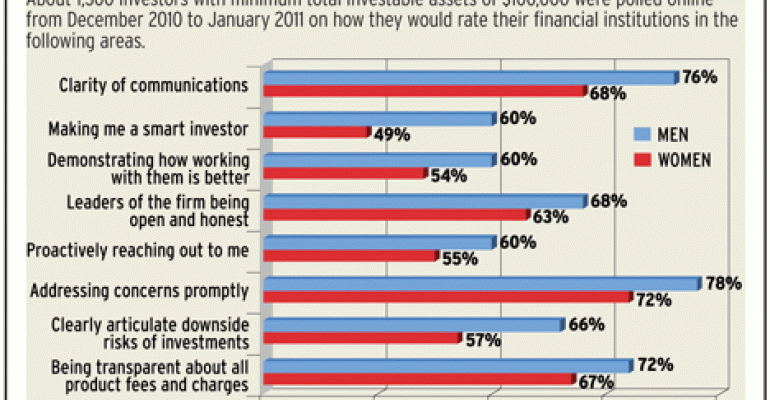Attention financial advisors: your women clients may have a lower opinion of your skills than you imagine. A new advisors’ guidebook released this morning by Pershing cites a survey of men and women investors that found that in 16 areas of a financial firm’s practice, women were more dissatisfied than men in every single category—from communication issues to transparency about charges and fees.
It may come as no surprise, then, that more than 70 percent of married women fire their financial professionals within a year of their husbands’ deaths, according to the guide, “Women Are Not A ‘Niche’ Market. They Are A Significant Business Opportunity.” And it’s no casual loss of business to an advisor, Pershing adds, since half of women over age 65 outlive their husbands by 15 years.
The irony, says Kim Dellarocca, director of practice management at Pershing Advisor Solutions, is that women have many qualities that make them ideal clients for financial advisors. Not least of which is their affluence; they make a growing share of the professional class, and 26 percent of women earn more than their husbands.
Perhaps most importantly, they want help—Dellarocca says 46 percent of women surveyed are likely to seek professional financial advice. They tend to be more patient with investments than men, and far less tolerant of risk; in the 2011 Sullivan Trust Study cited by Pershing, 50 percent of women described themselves as “very” or “somewhat” conservative regarding risk tolerance, compared to 34 percent of men. Dellarocca says it’s important for advisors to articulate the downside of investments to women clients when discussing the family portfolio.
She offered these other tips for advisors who want to keep women as clients:
• Ask that both members of the client couple attend your next meeting to discuss their finances. Dellarocca recommends that advisors not just discuss ways to accumulate wealth, but also to communicate the benefits of financial plans in a way that addresses women’s priorities—“Because it protects their family, because it helps them ensure they’re not dependent on somebody, or they can afford their long-term health-care goals.”
• Treat the women as equal partners in the relationship.
• Listen to each voice. Personal finance expert Susan Hirshman, author of the women’s financial guidebook, Does This Make My Assets Look Fat? suggests that advisors go back to “Sales 101” in their approach to women clients. Hirshman says they should ask themselves, “Who is this person? How do they think? How do I adapt my style to make this person feel comfortable?”
• Host “couple-friendly” events or workshops to reinforce your interest in both parties in the relationship.
• Ask for the woman client’s e-mail address to directly send her investment newsletters and other material.







